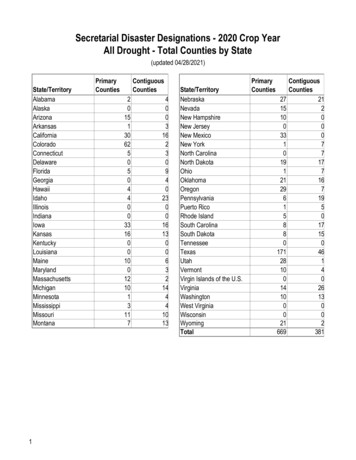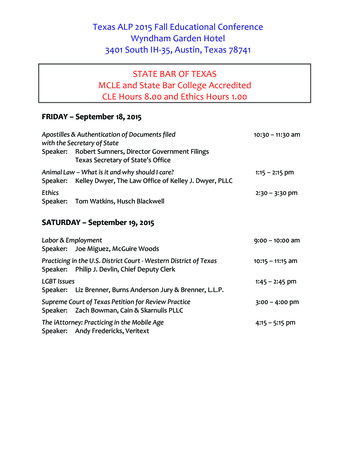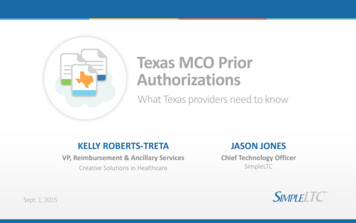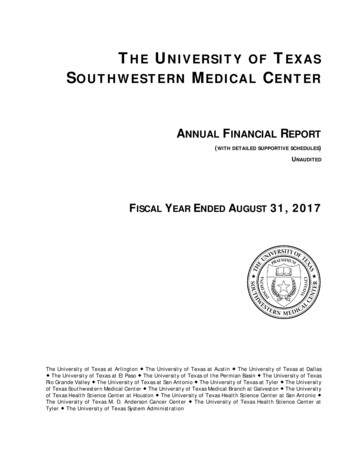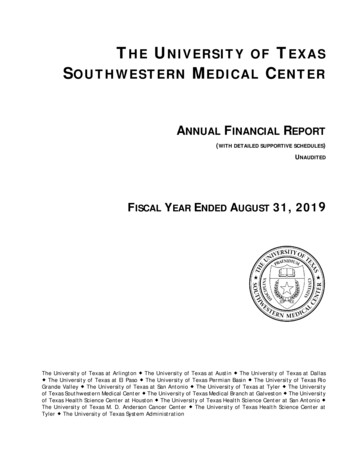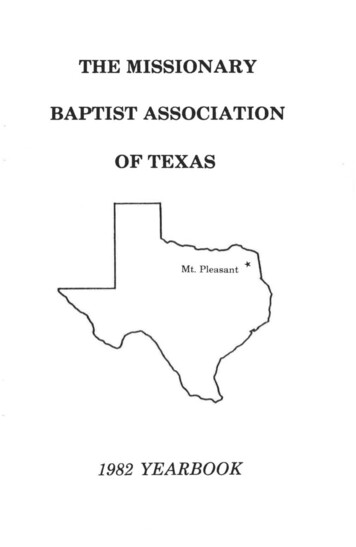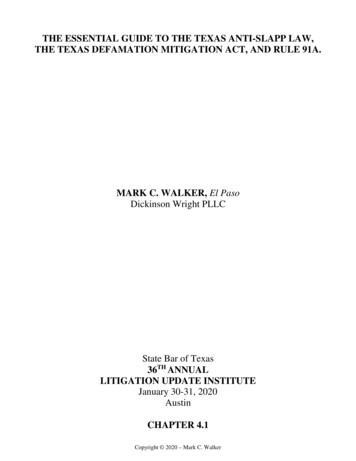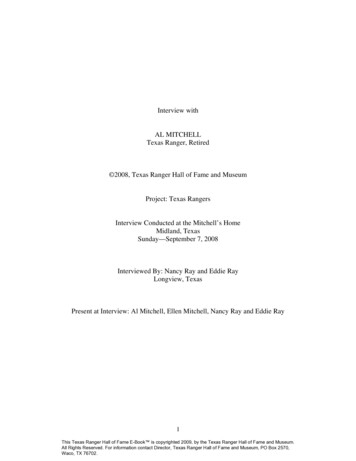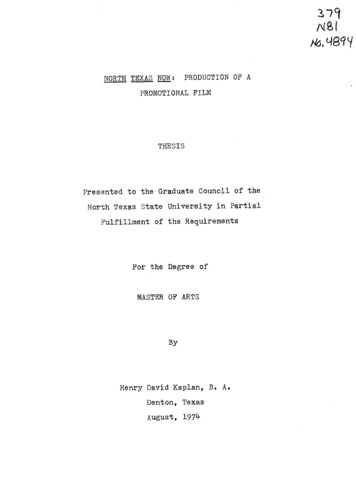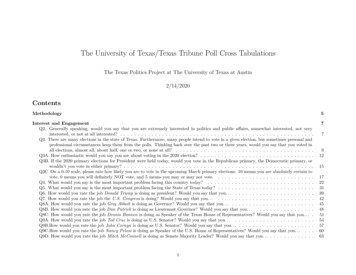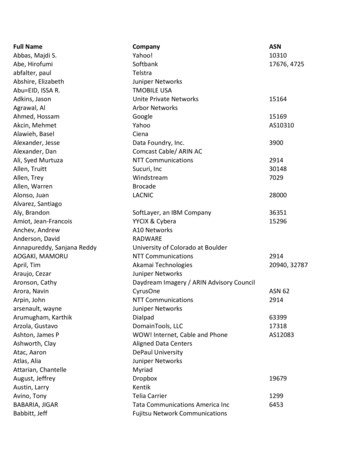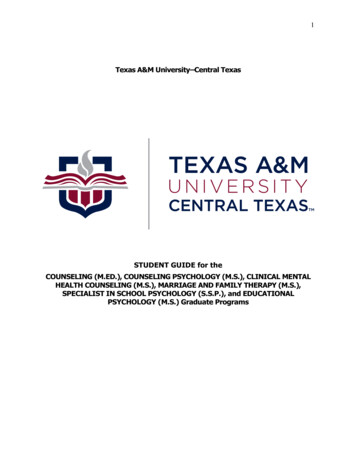
Transcription
1Texas A&M University–Central TexasSTUDENT GUIDE for theCOUNSELING (M.ED.), COUNSELING PSYCHOLOGY (M.S.), CLINICAL MENTALHEALTH COUNSELING (M.S.), MARRIAGE AND FAMILY THERAPY (M.S.),SPECIALIST IN SCHOOL PSYCHOLOGY (S.S.P.), and EDUCATIONALPSYCHOLOGY (M.S.) Graduate Programs
2Table of ContentsContentsStudent ChecklistPart 1: Admissions and Information for the StudentProgram OptionsStatement of Informed ConsentProgram Admission: School Counseling ProgramProgram Admission: Clinical Mental Health ProgramProgram Admission: Marriage & Family ProgramProgram Admission: Educational Psychology ProgramProgram Admission: Specialist in School Psychology ProgramEthical StandardsFaculty AdvisementStudent’s ResponsibilitiesDegree PlanPart 2: Program Performance StandardsProgram StandardsAcademic Appeal PolicyStudent Retention PolicyStudent Review PolicyProfessional Endorsement PolicyComprehensive ExaminationThesisGraduationPart 3: Field PlacementCoursesEligibilityApplications and DeadlinesSelection of Practicum and Internship SitesLiability InsurancePart 4: Professional IdentityProfessional AssociationsHonor SocietiesPart 5: Certification and LicensureAppendicesAppendix A. Performance Fitness Evaluation FormAppendix B. Confidentiality FormAppendix C. Informed Consent FormAppendix D. MFT Fieldwork - Prerequisite Verification FormAppendix E. CMHC Fieldwork - Prerequisite Verification FormAppendix F. School Counseling Fieldwork - Prerequisite Verification FormAppendix G. School Psychology Fieldwork – Prerequisite Verification FormAppendix H. 48-Hour LPC Fieldwork – Prerequisite Verification FormAppendix I. 48-Hour LMFT Fieldwork – Prerequisite Verification 121222223232324262829303132333536
3Student ChecklistApply to the office of Graduate Studies. This includes:Completing and submitting tudies/index.php)the Graduate School Application for Admission form where thestudent indicates which degree program in the department ofPsychology and Counseling he or she is applying forSubmitting current Graduate Record Examination (GRE) scores(if required). Note: Any undergraduate who obtained a 3.0 GPAor higher is exempt from taking the GRE for universityadmission to Graduate Studies. However, some programs inthe department still require submission of GRE scores.Submitting official transcripts of all undergraduate and graduateacademic courseworkWriting and submitting a 200-300 word essay addressing careerand academic goalsNote: Admission to the Graduate School does not guarantee admission to agraduate degree program in the Department of Psychology and Counseling.Complete the Programs of the Psychology & Counseling DepartmentApplication x.php)that is posted online (application process will vary across programs; seebelow)Meet with a graduate program coordinator prior to enrolling in any coursesin a degree program in the Department of Psychology and CounselingMeet with a faculty graduate advisor to complete a degree plan AFTER FULLADMISSIONApply for field work courses (e.g., MFTK 530, MHCK 505, or PSYK 505) inthe semester prior to enrolling in it (must apply each semester for eachcourse) if required by the programApply to take comprehensive exams if required by the programApply for graduation and participation in graduation ceremony
4PART 1: ADMISSIONS AND INFORMATION FOR THE STUDENTProgram OptionsStudents may choose from different graduate degree programs within the department.Reference should be made to the university catalog and the advising guide sheets(available from the department office or an advisor) for specific courseworkrequirements within each of these options. Each student must declare which program they are applying for when applying tothe department for program admission and acknowledge this choice when a degreeplan is filed. Students will graduate with a graduate degree under only one program. Students may take courses not listed on their degree plans after obtaining approvalfrom their program coordinator and completing all necessary prerequisite courseswith the understanding that these courses are electives and may not satisfyrequirements for graduation in some programs.Available programs include: School Counseling (M.Ed. Counseling with or without eligibility for the LicensedProfessional Counselor). Clinical Mental Health Counseling (M.S. Mental Health Counseling). Marriage & Family Therapy (M.S. Marriage & Family Therapy). Educational Psychology, experimental psychology emphasis (M.S. EducationalPsychology). Specialist in School Psychology (S.S.P.). Non-degree seeking certification programs include: School Counseling*Conferral of a degree is only the first step for students seeking professional licensure*Statement of Informed ConsentThe graduate degree programs include laboratory and field experiences in counseling,therapy, or psychology. These courses may include practicing counseling, therapy, andassessment skills with student peers; being interviewed by counseling or psychologypeers; and practicing newly-acquired and more advanced skills with actual clients atfield sites. Important components of student evaluation will include receptivity to thegiving and receiving of feedback (from peers, university instructors, and sitesupervisors) and ability to integrate such feedback into the student’s counseling,therapy, and assessment behaviors. Feedback will include supervisor observations(from course instructors, program faculty, and site supervisors) of any limitations incounseling, therapy, and assessment skills, professional practice, and personal qualitiesand behaviors which may inhibit the student’s therapeutic abilities. Feedback (oraland/or written) will come in the classroom and lab settings, as well as in group andindividual supervision settings. Additional meetings with instructor and/or fieldsupervisor may be necessary. Progression through field experiences will depend upon aformative evaluation by the instructor that the student has acquired the skills necessaryfor the next level.
5Due to the nature of counseling, therapy, and psychology, and the faculty’sresponsibility to educate effective counselors and therapists, students may beencouraged to participate in experiential activities (including group counseling as well asattending and paying for counseling as an outside class activity). Signing aconfidentiality agreement, which is included in the appendix of this student handbook,protects student’s rights with regard to self-disclosure.Students are subject to the conditions of the department’s retention procedure includedlater in this guide.Program AdmissionAdmission to the School Counseling Program§ Admission Processo Obtain Conditional Admission to Graduate Studies at A&M-CentralTexas aduateadmissions/)o Complete the online Programs of the Psychology & CounselingDepartment hology/index.php) andsubmit all admission materials to the program coordinator by:§ July 1st (Fall)§ Nov 1st (Spring)§ Apr 1st (Summer)o Submit all of the following to the Psychology & Counseling Department§ Intent to Pursue Certification as a School Counselor (availablefrom the Department office)§ Graduate School Admission Letter§ Official Transcripts§ School Counseling Program Application (available from theDepartment office or the Program website)§ Resume/vita: A work experiences résumé or curriculum vitaedetailing your work and educational experience§ Valid Texas or Out-of-State Educator Certificate§ Complete Service Record(s) (If you only have 1 year ofTeaching Service, you must supply a Letter of FutureEmployment)§ A 200- to 300-word essay addressing career and academicgoals, personal strengths and weaknesses, and professionalgoals (can be same as that submitted to Graduate Studies).§ Copies of any professional licenses and certifications currentlyheld.o Your materials will be reviewed by program faculty, and you will eitherbe invited to complete an interview/orientation or notified that yourapplication was denied. School counseling faculty facilitates
6§the admissions interview and orientation. The purpose of thisrequirement is to further explore the applicant’s personal qualities thatare useful for graduate and professional work as a school counselor, toclarify any questions held by either the faculty or applicant, todetermine if the applicant’s professional goals are in alignmentwith the objective of the program, and to share more informationabout the program and course work with the applicant.§ At the interview you will also complete an on-site writing sample(500 words).§ During or after your interview, you may have additionalprogram requirements to complete.o Upon invitation, schedule and complete an individual interview by:§ Aug1st (Fall)§ Dec 1st (Spring)§ May 1st (Summer)o Applications received after the established deadlines will be reviewedon a case-by-case basis if space is available.o Following the interview, students will be granted ConditionalAdmission, or informed that their application for admission has beendenied.o Students may be granted Conditional Admission status until the first 12semester hours are completed.o Coursework taken by students with Conditional Admission must beapproved by the program coordinator.o Once all admission requirements have been met the student packetwill be presented to the Education Preparation Committee (EPC) for avote of acceptance of requirements for school counseling certificationupon completion of the degree program. Upon acceptance of the EPC,Full Admission will be granted.Admission Requirementso Bachelor’s degree from a fully accredited institution.o Minimum GPA of 3.0 in the last 60 semester hours completed.o Clinical/Work/Volunteer Experience: Teacher certification needed aswell as two years teaching experience.
7Admission to the Clinical Mental Health Counseling Program§ Admission Processo Obtain Conditional Admission to Graduate Studies at A&M-CentralTexas aduateadmissions/)o Complete the online Programs of the Psychology & CounselingDepartment hology/index.php) andsubmit all admission materials to the program coordinator by:§ July 1st (Fall)§ Nov 1st (Spring)§ Apr 1st (Summer)o Submit a GRE score. Your materials will be reviewed by programfaculty, and you will either be invited to complete aninterview/orientation or notified that your application was denied.Counseling faculty facilitate the admissions interview and orientation.The purpose of this requirement is to further explore theapplicant’s personal qualities that are useful for graduate andprofessional work as a counselor, to clarify any questions held byeither the faculty or applicant, to determine if the applicant’sprofessional goals are in alignment with the objective of the program,and to share more information about the program and course workwith the applicant.o Upon invitation, schedule and complete an individual interview by:§ Aug1st (Fall)§ Dec 1st (Spring)§ May 1st (Summer)o Following the interview, students will be granted Full Admission,Conditional Admission, or informed that their application for admissionhas been denied.o Students failing to meet full admission requirements may be grantedconditional admission status until the first 12 semester hours arecompleted.§ If denied conditional admission, students may re-apply foradmission after successful remediation. Students areresponsible for this remediation following input from theirgraduate coordinator.§ Conditionally admitted students must enroll in courseworkapproved by their graduate coordinator and receive a gradepoint average (GPA) of 3.25 or above on the specifiedcoursework to be eligible for full admission.§ Students will not be permitted to enroll in additional courseworkin counseling (CNSK), counseling psychology (CPSK), mentalhealth counseling (MHCK), marriage and family therapy (MFTK)or psychology (PSYK) beyond the first 12 semester hours if notfully admitted to a program in the department.
8Conditionally admitted students who are denied full admissionafter completing 12 semester hours may re-apply for admissionafter successful remediation. Students are responsible for thisremediation following input from the graduate coordinator ofthe program to which they are applying. Remediation plans are designed to be specific to astudent’s needs. They may involve one-on-oneconsultation with faculty, additional undergraduatecoursework, professional development activities, use oftutoring services, etc.o Applications received after the established deadlines will be reviewedon a case-by-case basis as space is available.Admission Requirementso Conditional Admission by Graduate Studieso Bachelor’s degree from a fully accredited institution.o Minimum GPA of 3.0.o Clinical/Work/Volunteer Experience: While specific experience notrequired, previous related work experience may make applicant morecompetitive.o Timely submission of admission materials.Admission Materialso Programs of the Psychology & Counseling Department Application:This application can be found online at the Psychology & CounselingDepartmental website.o References: Three letters of recommendation concerning theapplicant's academic and professional abilities and potential arerequired. These letters should address the applicant's ability to meetgraduate-level academic challenges and to work in the counselingprofession.o Personal Statement: An essay describing why the applicant wants topursue professional counseling as a career. In addition, the statementshould include what the applicant thinks his or her strengths are forcounseling, and any other qualities which speak to the applicant’spotential for success in the counseling program. Limit the statement tono more than two pages double-spaced.o Resume/CV: A work experiences résumé or curriculum vitae.o Copies of any professional licenses currently held.§§§
9Admission to the Marriage & Family Program§ Admission Processo Obtain Conditional Admission to Graduate Studies at A&M-CentralTexas aduateadmissions/)o Complete the online Programs of the Psychology & CounselingDepartment hology/index.php) andsubmit all admission materials to the program coordinator by:§ June 1st (Fall)§ Nov 1st (Spring)§ Apr 1st (Summer)o Submit a GRE score. Your materials will be reviewed by programfaculty, and you will either be invited to complete an interview ornotified that your application was denied.o Upon invitation, schedule and complete an individual interview by:§ July 1st (Fall)§ Dec 1st (Spring)§ May 1st (Summer)o Applications received after the established deadlines will be reviewedon a case-by-case basis if space is available.§ Admission Requirementso Bachelor’s degree from a fully accredited institution.o Preferred minimum GPA of 3.0.o Clinical/Work/Volunteer Experience: While specific experience notrequired, previous related work experience may make applicant morecompetitive.o Timely submission of admission materials.§ Admission Materialso Departmental application: The Departmental application can be foundonline at the Departmental website.o References: Three professional references are required fromcolleagues or supervisors who can attest to the applicant's clinicalknowledge, skill, and potential aptitude for graduate study.Recommendation letters must include address, phone number, andsignature of recommender. The envelope must be submittedunopened. If a recommender prefers to submit an original, hard copyletter, please remind them that it must include an ink signature and besubmitted in a sealed envelope.o Personal Statement: An essay describing your pertinent humanservices experiences and how they will enhance your development asa marriage and family therapist.o Resume/CV: A work experiences résumé or curriculum vitae.o Copies of any professional licenses currently held.o Most recent GRE scores
10Admission to the Educational Psychology Program§ Admission Processo Obtain Conditional Admission to Graduate Studies at A&M-CentralTexas aduateadmissions/)o Applicants must complete the online Programs of the Psychology &Counseling Department hology/index.php) andsubmit all admission materials to the program coordinator by:§ July 1st (Fall)§ Nov 1st (Spring)§ Apr 1st (Summer)o Each applicant’s materials will be reviewed by program faculty, and theapplicant will be notified via email of the admission decision.o Applications received after the established deadlines will be reviewedon a case-by-case basis if space is available.§ Admission Requirementso Bachelor’s degree from a fully accredited institution.o Minimum GPA of 3.0.o Research Experience: While research experience is not required, anyresearch experience applicants have should be noted in applicationmaterials.o Timely submission of admission materials.§ Admission Materialso Departmental Application: The online Programs of the Psychology &Counseling Department hology/index.php) on theDepartment webpage must be completed.o Personal Statement: An essay describing why the applicant wants topursue a research-based career in psychology and how the degree willhelp him/her achieve professional and/or personal goals isrequired. The essay should include a description of how the applicantplans to use the degree to advance his or her career, the type ofresearch-related profession the applicant plans to enter, the applicant'sstrengths and weaknesses as they pertain to graduate-level study withan explanation of how the applicant plans to overcome theweaknesses described, and any other qualities which speak to theapplicant's interest in and potential to succeed in the ExperimentalPsychology Program. The essay should be no less than 400 words andno more than 600 words. The essay must be typed, double-spaced,and submitted electronically as an attachment to the email addressprovided in the Departmental Application.o Statement of Research Interests and Experience: An essay describingthe applicant's experience in performing research and the areas ofresearch the applicant is interested in pursuing is required. The essayshould describe all research experiences including (but not limited to)
11the number and types of research papers written for coursework,research-based honors projects, work with faculty members onresearch projects, lab assistantships (paid or unpaid), conferencepresentations, publications, etc. The essay should also include adescription of the applicant's ideas and plans for conducting researchin the future such as the variables, samples, and/or applications thatthe applicant wants to explore. The essay should explain why theapplicant's interests are a good fit with the Educational PsychologyProgram at TAMU-CT. The essay should be no less than 400 wordsand no more than 600 words. The essay must be typed, doublespaced, and submitted electronically as an attachment to the emailaddress provided in the Departmental Application.o Resume/CV: A résumé or curriculum vitae summarizing the applicant’seducation and work experiences should be submitted with the rest ofthe materials.
12Admission to the Specialist in School Psychology Program§ Admission Processo Obtain Conditional Admission to Graduate Studies at A&M-CentralTexas aduateadmissions/)o Submit a GRE score and complete the online Programs of thePsychology & Counseling Department hology/index.php) andsubmit all admission materials to the program coordinator by:§ July 1st (Fall)§ Nov 1st (Spring)§ Apr 1st (Summer)o Applications received after the established deadlines will be reviewedon a case-by-case basis if space is available.o The SSP program may conditionally admit students for one semesterto allow them time to obtain an acceptable GRE score as long as theymeet all other admission standards.§ Admission Requirementso Bachelor’s degree from a fully accredited institution.o Minimum GPA of 3.0.o Clinical/Work/Volunteer Experience: While specific experience is notrequired, previous related work experience may make applicant morecompetitive.o Timely submission of admission materials.§ Admission Materialso Departmental application: The Departmental application can be foundonline at the Departmental website.o Personal Statement: An essay describing why the applicant wants topursue professional counseling as a career. In addition, the statementshould include what the applicant thinks his or her strengths are forcounseling, and any other qualities which speak to the applicant’spotential for success in the SSP program. Limit the statement to nomore than two pages double-spaced.o Resume/CV: A work experiences résumé or curriculum vitae.o Copies of any professional licenses currently held.
13Ethical StandardsAll students are expected to understand and practice the ethical codes and standards ofconduct of their appropriate professional organization, certification and/or licensingboard. These include: thethethethetheAmerican Counseling Association (ACA)American Psychological Association (APA)American School Counselor Association (ASCA)American Association for Marriage and Family Therapy (AAMFT)National Association of School Psychologists (NASP)Students are also expected to understand and adhere to the standards of conduct forstudents at Texas A&M University - Central Texas (A&M-Central Texas). Violations ofprofessional ethical standards or University rules could indicate a student is unfit tocontinue in the program.Students are expected to periodically review the ethical standards to ensure continuedunderstanding and practice.Advisors and faculty members at A&M-Central Texas have an obligation to respondwhen students are in violation of professional ethical standards or University rules ofconduct. Additionally, the Office of Student Affairs may take action when a studentviolates the Student Code of Conduct.Faculty AdvisementStudents are required to seek advising by faculty advisors regarding coursework,certification and licensing requirements, program policies and procedures, requests tochange degree plans, and assistance with other educational or career needs. A faculty advisor is assigned to each student according to area of emphasis anddegree plan. Students may consult with any faculty member but are urged to workwith their assigned advisor as much as possible due to his/her expertise andknowledge in the student's area of emphasis. Advising is a continuous process, and faculty advisors are assigned many students toadvise in addition to their other workload requirements, such as teaching, service,and research. Students should demonstrate respect for the faculty advisor's time bysetting appointments and being prepared for their appointments as much aspossible.Student's ResponsibilitiesStudents have a responsibility for their learning. Other responsibilities include: Reading the A&M-Central Texas catalog each year to determine if changes impactthem Reading and adhering to professional ethical standards
14 Meeting registration and payment deadlinesParticipating in activities and projects, internal or external to the University, that willenhance their learning experienceFollowing the degree plan outline as closely as possible and being aware of allcourse prerequisitesPreparing for courses by making arrangements to attend regularly scheduledclasses, allowing for adequate study time, completing assignments on a timely basis,and taking the final exam as scheduledIdentifying skill strengths and working toward development of skills that needimprovementAsking questions to obtain information regarding topics they do not understandAcquiring and maintaining a minimum of 1,000,000 ( 3,000,000 aggregate) inprofessional liability insurance prior to taking clinical practicums and internshipsPreparing for the site-based practicums and internships in advance of the semesterin which they will be taken, including submitting application forms by posteddeadlinesSuccessfully completing the comprehensive examination or thesisMeeting graduation requirements and deadlinesCollecting and maintaining documentation of practicum and internship hours whichwill be needed when applying for certification or licensureBecoming identified with the professional community (e.g., participating inprofessional activities and/or joining a professional association such as APA, ACA,ASCA, AAMFT, National Association of School Psychologists (NASP), TexasCounseling Association (TCA), etc.) – see Part 4 of this handbook.Degree PlanOnce Full Admission to a Program is granted, a student should contact his/her graduateadvisor to discuss a plan for completing coursework as soon as possible and complete aGraduate Degree Plan Acknowledgment & Responsibility Form, which will be signed bythe student, graduate advisor, and the Department Chair (or College Dean). Note:Students who are non-degree seeking are not in a degree program and are not eligibleto file a degree plan. Care must be taken to select courses that also meetrequirements for special credentials the student may be seeking such as licensure orcertification. See the Certification and Licensure section of this guide for more details.
15PART 2: PROGRAM PERFORMANCE STANDARDSProgram StandardsStudents must maintain high scholastic standards and develop skills necessary to workwith people with diverse needs. Students are expected to demonstrate emotional andmental fitness in their professional fields and to conform to the code of ethics ofrelevant professional associations and the state of Texas. A student's acceptance in theClinical Mental Health, Counseling, Counseling Psychology, Educational Psychology,Marriage and Family Therapy, or School Psychology programs does not guaranteeprofessional fitness that is required to remain in the program. See Student RetentionPolicy described below regarding what procedures will be followed when faculty believestudents are not fit for a particular program.Academic Appeal PolicyI. Overview: The College of Education Grade Appeal Policy was designed to protectstudents from biased or inaccurate evaluation procedures without unfairlyimpinging on the academic freedoms of the faculty. Consistent with this, it isrecognized that:a. Students have the right for their work to be evaluated fairly andaccurately using a method consistent with professional academicstandards.b. Faculty members have the right to evaluate students’ work using anymethod that is professionally acceptable, submitted in writing to allstudents, and applied consistently to all students.c. It is assumed that A&M-Central Texas faculty members appropriatelyevaluate students’ work, so the burden of proof for a grade appeal lieswith the student.II. Academic Dishonesty: The process for appealing a professor’s determination thata student has engaged in academic dishonesty is separate from the process fordetermining if a grade was determined fairly/accurately. If a student wishes toappeal a grade that was influenced by the faculty member’s belief that thestudent violated the university’s academic integrity policy and the student deniesthese allegations, the student must complete the university appeal process foraccusations of violating the academic integrity policy prior to initiating a gradeappeal.III. Justification for an Appeal: Grade appeals may only be initiated if the grade wasinfluenced by one of the following:a. Error: A clerical/computational error was made in calculating/reporting thegrade.b. Prejudice: The faculty member’s evaluation of the student’s work wasinfluenced by the faculty member’s negative attitude toward the student.c. Arbitrary method: The grading procedure employed departed substantiallyfrom accepted academic norms in a manner that indicated a failure toexercise professional judgment (e.g., no explanation given regarding the
16basis for assigning point values to assignments; grading proceduredeviated substantially from what was stated in the syllabus withoutnotifying students in advance of this change).d. Inconsistent application: The student’s grade was not determined usingthe same process applied to other students in the course.e. Unsubstantiated charge of dishonesty: The grade was based on a chargeof academic dishonesty by the student which has been determined by theuniversity to be unsubstantiated by the evidence presented.-Insufficient reasons upon which to base an appeal include:a. Disagreement with course policies that are clearly communicated inwriting to all students.b. Differences in policies among sections of the same course or acrossfaculty members.c. Potential negative impact on the student (e.g., loss of financial aid).d. Dissatisfaction with instructional style and/or methods (Note:Students who have complaints regarding the instruction they receiveshould address these directly with their instructor or that facultymember’s supervisor).IV. Appeal Process:a. A student who wishes to appeal a decision of a faculty member mustrequest a review by that person within 30 calendar days of the originatingevent using the Grade Appeal Form (located on the website for theCollege of Education).i. The faculty member is required to give the student a writtenresponse within 15 calendar days.ii. The response by the faculty member (or his or her immediatesupervisor) should be made using the Appeal Response Form(located on the website for the College of Education).iii. For an appeal of a course grade the ori
requirements for graduation in some programs. Available programs include: School Counseling (M.Ed. Counseling with or without eligibility for the Licensed Professional Counselor). Clinical Mental Health Counseling (M.S. Mental Health Counseling). Marriage & Family Therapy (M.S. Marriage & Family Therapy).
